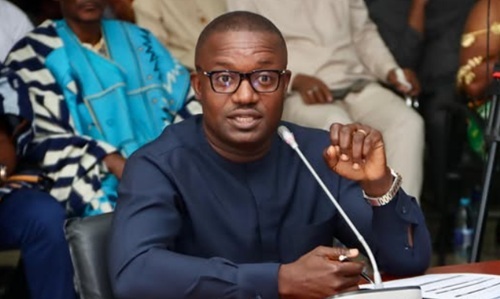The Minister of Energy and Green Transition, John Jinapor, has put concerns about a looming power crisis to rest, assuring Ghanaians that the government is taking proactive measures to ensure a reliable electricity supply amid the growing demand and infrastructural challenges.
In an interview with the Daily Graphic, the minister outlined a comprehensive plan to prevent a power crisis, citing recent efforts to boost fuel supplies and accelerate renewable energy projects, as the government worked to guarantee a stable electricity supply.
Foremost, he said the government was to receive 450,000 barrels of light crude oil (LCO) shipment yesterday, which was ordered a month ago, to fire thermal plants to alleviate some of the pressures on the country's energy needs.
In spite of having only 2.6 days of fuel stock, Mr Jinapor said the arrival of the crude oil would help stabilise the situation.
"We shouldn't panic. We will be okay. There is no looming power crisis," he emphasised.
Rising concerns
The minister's comments come amid rising concerns over Ghana’s energy supply in the face of huge debts falling due which could not be paid as of last year.
Mr Jinapor maintained that the government remained committed to ensuring uninterrupted power delivery across the country.
He said in addition to the crude oil shipment, power producers were also taking delivery of 10,000 tonnes of Heavy Fuel Oil and 20,000 tonnes of distillate fuel to augment current stocks.
Karpowership
The Energy Minister confirmed that an independent power producer, Karpowership, had withdrawn its threat to shut down operations over nearly $400 million debt owed it by the government.
He said following successful negotiations, the company had agreed to continue providing power, easing concerns over potential disruptions to the national grid.
However, Mr Jinapor said the government would meet with the power producer in the coming days to agree on phased payments, while the two sides had also agreed in principle to an audit and negotiation of the debt.
The company had earlier issued an ultimatum that if its debts were not paid up by yesterday, it would switch off its turbines due to the inability to recover debt owed by the government.
Indebtedness
The country’s power sector debt stands at $1.7 billion, with significant arrears owed to key players, including $297 million to Sunon Asogli, $220 million to CENIT and $423 million to CenPower.
Mr Jinapor announced that the government would validate the outstanding debt claims in the power sector, with the aim of renegotiating the arrears, a move expected to help resolve the longstanding debt issues plaguing the sector.
Energy mix
He said the ministry had launched a 150 off-grid solar systems as part of efforts to diversify the country’s energy mix and reduce dependence on fossil fuels, part of a broader strategy to promote renewable energy and increase access to electricity in rural areas.
The Energy and Green Transition Minister said his outfit would soon cut the sod for the construction of 33 mini-grid solar projects in the Oti, Savannah and Bono East regions.
The project, which will be the single biggest mini-grid project in the country, is expected to connect over 70,000 people on islands to electricity, providing a much-needed boost to economic activity in these areas.
With combined capacity of 4.5 megawatts (MW), it would supply electricity to 47 island communities, he said.
Solar project
He said the mini-grid solar project was a significant step towards achieving the country’s renewable energy targets and promoting sustainable development.
It was also expected to reduce the country's reliance on fossil fuels and mitigate the impact of climate change, Mr Jinapor added.
Again, over 1,450 solar home systems would be installed to provide electricity to off-grid homes, small and medium enterprises (SMEs), schools, and Community Health Planning and Services (CHPS) compounds.
“These projects also demonstrate the government's commitment to harnessing the country's renewable energy potential to drive economic growth and improve the lives of its citizens,” the Energy and Green Transition Minister said.
Karpowership committed
Meanwhile, Karpowership Ghana, the operator of the floating power plant, Karadeniz Powership Osman Khan, has given the assurance that its plant would not shut down in spite of the financial challenges.
The company said it remained committed to delivering reliable to propel national development and to avert any discomfort.
The Communications Manager of Karpowership Ghana, Sandra Amarquaye, told Dotsey Koblah Aklorbortu in Takoradi that the company was having discussions with the government over the debt issue and that the company had made good progress in that regard.
“We have been in active discussions with the government over the issue of accrued debt.”
“We remain optimistic about the mutually beneficial outcomes,” she said.
Karpowership contributes approximately 12 per cent to the country’s total electricity supply.
The power barge, currently moored at the Home Port of Western Naval Command, Sekondi, has been a key player in Ghana’s energy landscape since 2015.
The floating power plant has helped to bridge critical energy gaps through its innovative and rapid deployment model.
Despite financial pressures, Ms Amarquaye said the company was continuing operations, which she said underscored its commitment to being a dependable partner in Ghana’s energy sector.
“Let me reiterate our unwavering commitment to delivering reliable power to the national grid despite the financial challenges.
As a company, our primary focus is to continue supplying stable and efficient electricity to support homes, businesses and industries across the country,” she said.

